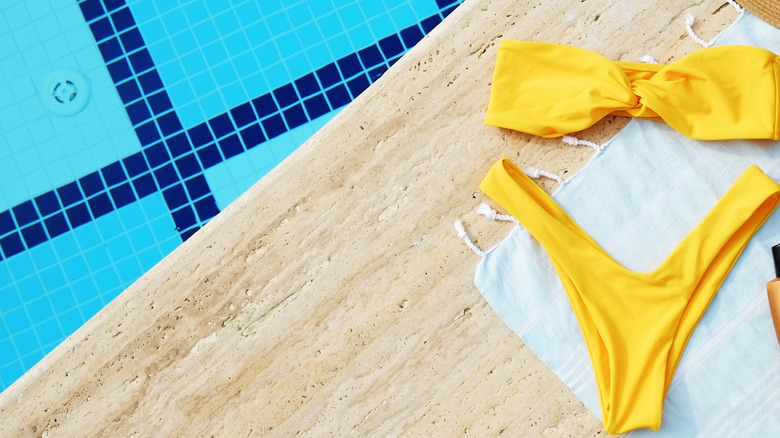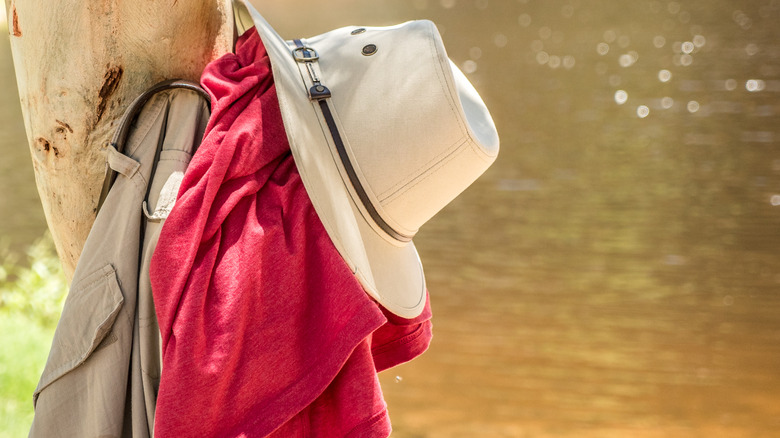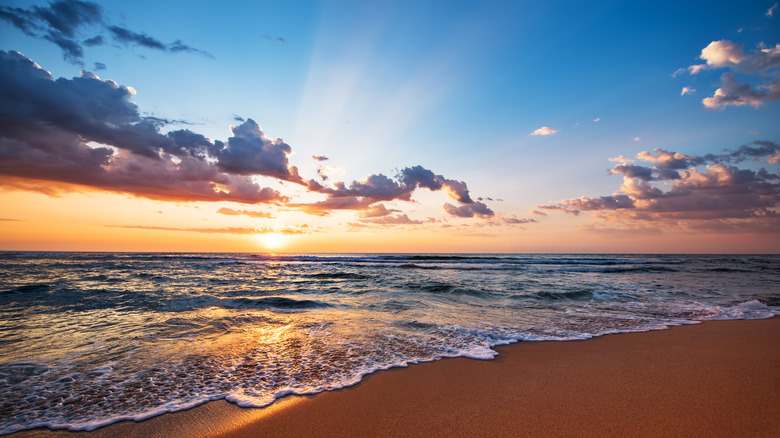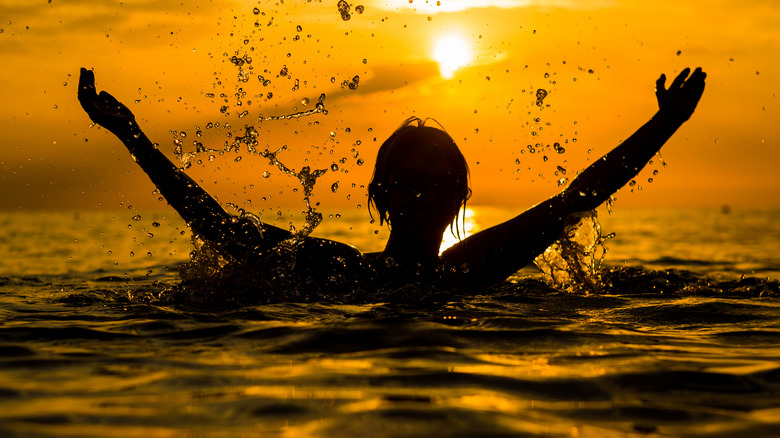What Happens To Your Body When You Go Skinny Dipping
For some, the thought of going skinny dipping sounds like nothing more than a "truth or dare" ultimatum at a high school party. For others, taking a dip in the nude is a celebrated wellness practice. It has earned itself a spot on the National Day Calendar, with International Skinny Dip Day coming around every July. As it turns out, skinny dipping has a number of physical and mental health benefits. To better understand these benefits, let us first debunk a few common myths about the practice.
According to the Volonte Science and Medical Advisory Board, the act of swimming nude is about embracing freedom and self-love, as opposed to the widely-held belief of it being a sexual act. It is not an invitation to stare at or photograph others without their permission. While environments, such as nude beaches, provide a communal space for this practice, it can also be practiced as a solo activity.
The act of skinny dipping engages both the mind and body, so in what ways does this form of nakedness benefit our health?
The physical and mental benefits of skinny dipping
Skinny dipping allows the sun's rays to hit every part of our body. As a result, our skin is soaking in a hefty helping of vitamin D. Even just a quick 15-minute dip can boost immunity far more than any supplement can (via Volonte). Not to mention, vitamin D also does wonders for brain and bone function while enhancing quality of sleep (via Brooklinen). Additionally, sweat is completely released without the hindrance of tight clothing, allowing toxins to be fully flushed from the body.
In addition to physical benefits, the wellness benefits of skinny dipping also extend into one's mental and emotional health. A 2017 review published in the Journal of Happiness Studies found that engaging in nude recreational activities had a positive impact on self-confidence, body image, and quality of life. Nude events hosted in different countries around the world, such as group swims or biking events, demonstrate the public's growing acceptance of public nudity. The review also examined past research regarding the relationship between parental nudity and its effects on children. Kids exposed to parental nudity during childhood were at a lower risk for drug usage and had higher rates of self-acceptance.
Skinny dipping also promotes body positivity within oneself, as well as amongst others, according to Volonte. With so many healing benefits, if comfortable, taking a dip "au-natural" may be worth a try as a form of self-care.
The top skinny dipping-friendly countries
A 2011 poll conducted by Metromint water company revealed that 56% of a total of 1,000 people surveyed reported having gone skinny dipping as a form of summertime fun (via Glamour). Nature resource website, Outforia, did a deep dive into the research to uncover the top skinny dipping-friendly countries worldwide. Determined by the number of naturist camps and nude beaches in each country, their data placed Spain in third place with a combined count of 517 nudist beaches and naturist camps. Next was the United States in second place with a total count of 552 nudist beaches and naturist camps — with California and Florida playing host to many of them. Lastly, in first place stood France with a combined total of 609 nudist beaches and naturist camps counted.
On the flip side, however, tourists will want to refrain from nude bathing in countries such as Russia, China, Brazil, India, and Turkey — all of which placed on Outforia's list of "Countries to Avoid Skinny Dipping." Their data also cited vacation hotspots such as the Bahamas, Saint Lucia, and Antigua as places where public nudity is generally frowned upon.
The legality of skinny dipping across states
Although the U.S. may have a number of nude beaches (via Outforia), different states have different laws regarding skinny dipping. Therefore, prior to disrobing, you'll want to make sure you're in the clear before doing so.
As reported by Refinery29, legal repercussions for public nudity can vary from minor to severe, involving fines, community service, being registered as a sex offender, or incarceration. Between states, allowances may also vary between topless exposure and genital exposure. Therefore, the best thing to do is to check the local state laws and stick to specified beaches, parks, spas, or other spots where skinny dipping is explicitly authorized.
It's important to note that many of these same laws apply to nudity on private property as well (via HG Legal Resources). While it may sound like a safer bet to go for a naked dip in the privacy of your own backyard, many states still deem this to be illegal. Alabama, Alaska, District of Columbia, Nebraska, California, Vermont, Idaho, Colorado, and Delaware are among such states where skinny dipping on your own property can be punishable by law if sighted (via The Backyard Way). So when in doubt, check those local laws.
How to set yourself up for an enjoyable experience
If you're considering giving skinny dipping a try, but are feeling uncertain as to how to navigate the experience, Cottage Life provides some tips that may help instill a sense of comfort and ease.
First and foremost, it's important to ensure your physical safety. If you're swimming in a natural body of water, be mindful of things such as leeches. In addition, be sure to pack your sunscreen and bug spray. Moreover, your risk of injury increases with alcohol, so it's best to skinny dip while sober.
Last and most importantly, there is no need to push beyond your personal comfort level. If you'd rather embark on your first skinny dipping experience alone, a nighttime swim can help reduce the chances of being seen or joined by fellow swimmers (per Explorer Chick). Conversely, if you do decide to partake in the experience with others, choose those whom you trust and feel comfortable around. After all, the end goal of skinny dipping is to feel centered, empowered, and confident.





